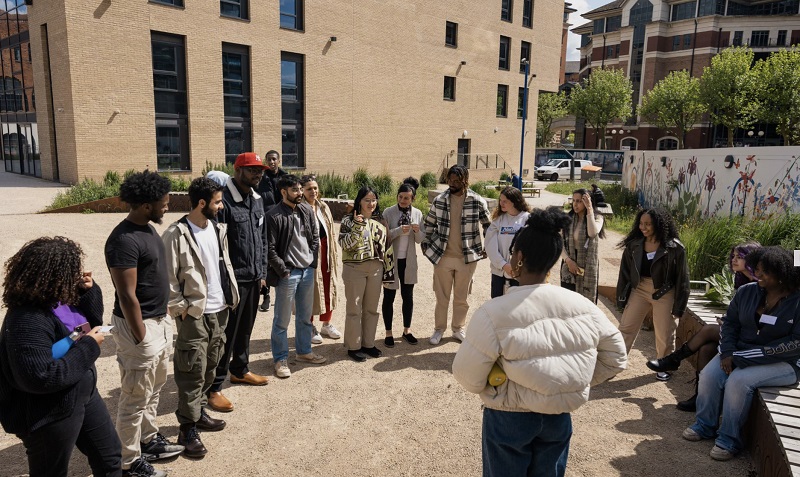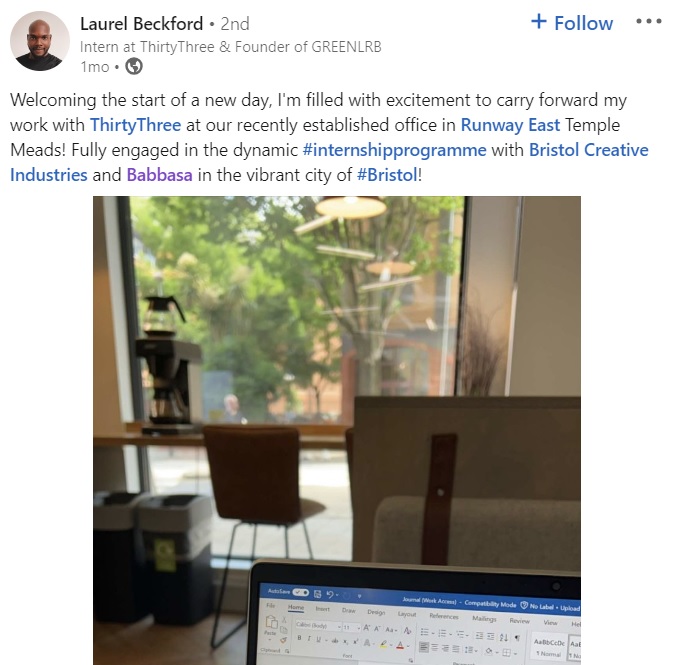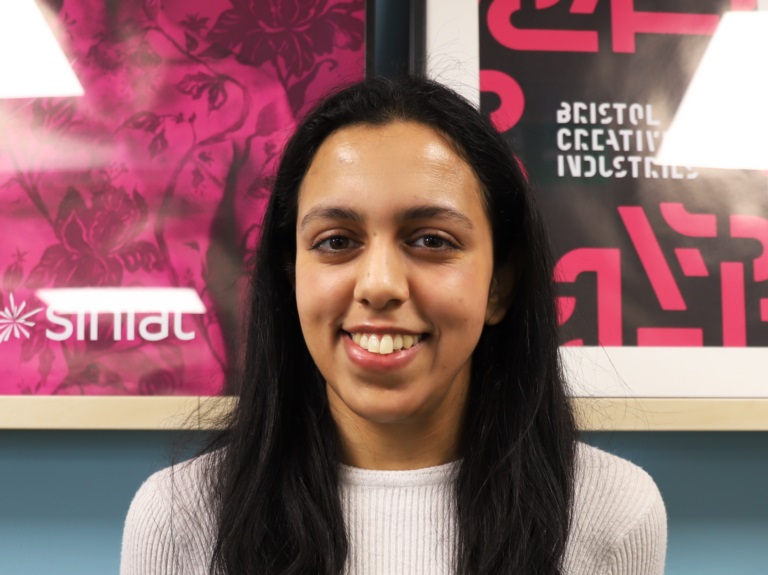Moonraker VFX, a Bristol-based Visual Effects Studio, took part in the RTS Futures Festival yesterday, offering valuable insights, advice and information to aspiring individuals seeking a career in the television industry.
The free event took place at M Shed on Bristol’s Harbourside and drew over 400 young attendees, where a range of the city’s media organisations were on hand to give careers advice.
Hosted by the Royal Television Society, the RTS Futures Festival provided a platform for industry professionals to connect with graduates and students, guiding them through the complexities of the modern broadcasting landscape.
Moonraker—known for its groundbreaking work in Natural History programming including the BBC’s recent Earth series—engaged with attendees, sharing knowledge and experiences to inspire the next generation of talent.
Simon Clarke, Creative Director at Moonraker, commented, “Participating in the RTS Futures Festival was a fantastic opportunity for us to connect with the bright minds set to become future leaders of the television industry in the decades to come. Moonraker’s presence at the event underscores the studio’s commitment to fostering talent and contributing to the growth of the sector.”
RTS Futures aims to help graduates and those in the early stages of their career to progress and learn about different areas of television. It has an ongoing calendar of events, learn more: https://rts.org.uk/rts-futures
Join Weston College in the heart of Bristol to learn more about supporting the next generation of creatives! Are you looking at offering work placements? Internships?
Looking to grow your team?
Give back to a new generation through guest lecture and project work?
Want to find out more about Weston College? We may surprise you….
The Faculty of Creative Arts Employer Forum is designed to work alongside industry to deliver industry aligned curriculum, work experiences, progression and employment routes and pipeline talent. Courses covered at Weston College and University Centre Weston include:
Game & Animation
Creative and Digital Media
Broadcast, Journalism and Podcasts
Performing Arts and Theatre
Art and Design – including fashion, textiles and business
Photography
https://www.weston.ac.uk/what-can-i-study/creative-arts-and-design-courses-16-18-year-olds
Tuesday 7th November
6-8pm
Bristol Training Institute, 12 Colston Avenue, BS1 4ST
RSVP [email protected]
Over the last year, mustard jobs have seen a surge in activity within the events industry across the UK. With Brexit, Covid and the Cost of Living Crisis significantly affecting the rate of movement within the industry in recent times. We’re breaking down the current trends, salary expectations, candidate availability and industry growth of the events sector.
At the beginning of the year we saw various external factors make candidates more hesitant about moving roles. Even though the cost of living remains high, the UK hasn’t plunged into a recession yet so candidates are maneuvering in the market again.
The events industry is booming across the UK, and Brand Experience within London remains a particularly busy sector for the mustard team for permanent and contract roles.
Covid-19 has become a memory of the past and as a result the Tradeshow Exhibition industry is back and better than ever. Virtual Broadcast has maintained popularity within the corporate space as streaming functionality is more accessible than ever. This has provided continued success for global brands looking to improve sustainability, reducing flights and event waste.
Whilst London still remains the hub of the event sector, other areas such as Manchester, Leeds and Bristol are seeing sharp growth, fueled by increased flexibility to work from home post pandemic. As a result, we’re seeing top talent move away from London.
Firstly, Sustainability. Eco washing has become a prevalent issue across the industry, with brands implying sustainability rather than working on making real positive change. As more candidates in the industry are looking to work within an actively sustainable organisation, being certified as B-Corp or part of an industry specific sustainability group such as Isla, will ignite candidate attraction.
Next up, Flexibility. As a lot of employees within the sector devote their weekends and evenings to meet the demand of the job, working the ‘allotted’ 9-5 are becoming increasingly difficult to adhere to whilst maintaining a work-life balance. As a result, there is increased pressure on employers to offer flexible hours to align with this.
The digital age has taken events to the next level. Consequently, employers are looking for event professionals with a mix of digital skills, the more digital integration the better. AR and VR offer interactivity that will engage audiences across the entire industry and showcasing any digital skills will give your CV the edge. This could include anything from working on virtual events, website registrations, video content, motion graphics, graphic design, animation and 360 photography.
Salaries have gone up drastically when comparing the mustard XP salary guide from 2021 to 2023. As an example, a Mid-weight 2D Designer working in London in 2021 would be earning around £28,000 – £36,000 but in 2023 they’re more likely £40,000 – £50,000.
This could be because a lot of candidates left industry during the Covid-19 lockdown period for job security elsewhere so there is smaller pool of candidates, as a result employers are battling for the top candidates, offering higher salaries to entice them into their role. As the industry has bounced back in full force the demand for skilled candidates has increased.
“The Experiential, Events and Exhibitions industries have fluctuated dramatically within my five years as a recruiter in this space. We’ve seen various highs and lows across the industry over the last few years, but now is such an exciting time to be expanding your business or to move into a new role.”
– Jamie Rogers, XP Divisional Lead at mustard jobs.
IN 2023, WE RECERTIFIED WITH A SCORE OF 130.3.
130.3 is an outstanding achievement and something we should all be very proud of.
In 2019, ADLIB was one of a small handful of recruitment businesses globally that certified as a B Corp, our starting point was a score of 82.8. Our belief is that the B Corp assessment provides a structure, with clear measurement, to set clear improvement targets. Our initial certification was simply the start of the journey.
We set out our intentions through the publication of our annual impact reports and set the bar high. This approach and transparency ensured we achieved the focus and accountability needed to make improvements and reach our goals.
This impact report reflects on our recertification, what we have achieved, and provides a glimpse into where we head next.
GOVERNANCE – In 2020 ADLIB converted to a 100% employee ownership model. True stakeholder capitalism. Our recertification score acknowledges this transparency, from an internal perspective with regards to the day-to-day financial management, quarterly updates and access to the entire P&L. External publication of impact reports on social and environmental performance and commitment to our code of conducts.
WORKERS – We’re a people business in every sense of the phrase. Since our initial certification we have invested heavily into our team through numerous initiatives to build a stakeholder model that is fit for the long term.
COMMUNITY – At the centre of any community is a shared belief in attitudes and interests in common. For ADLIB, community covers a lot of ground. We support regional ecosystems, provide insight and advocate for international communities that are fighting for equality. The team have built their own communities from the ground up, we’ve supported community based projects that improve people’s lives, and play an active role within the B Corp community.
ENVIRONMENT – As a B2B service provider we store an increasing amount of customer and candidate data. Given our learnings from within the Green Tech South West community, we are increasingly aware that the life cycle of storing, processing, and transmitting digital information is an area that we need to pay significant attention to.
CUSTOMERS – In 2021-22 we aimed to improve our customer score by 10 points via the MotherBoard Charter. After long discussion with B Lab it was concluded that Mums in Tech are not recognised as underserved. Furthermore, the initiative is a not for profit, charging charter signatories an administration fee only and therefore no points were awarded. Our response was threefold.
The Bristol Creative Industries Internship Programme, in partnership with Babbasa as part of the OurCity2030 initiative, is a stellar example of how BCI members can come together to fund and deliver a complex programme of internships and training to support some of the region’s most underrepresented young people.
After a successful pilot over the past few months with 14 brilliant agencies, we are now looking for more creative businesses to join our mission.
They will support the second cohort of interns during the next phase of this innovative project in 2024.
Agencies pay a one-off fee which covers:
✅ Onboarding to the programme including guidance and templates around internship structure/workplan.
✅ ED&I, mental health and neurodiversity training with a focus on working with young people from underrepresented groups.
✅ HR support and mentoring from Bristol Creative Industries’ dedicated internship programme manager Clare Leczycki.
✅ Recruitment and employment of two interns over six months.
If you are interested in taking part, email Bristol Creative Industries membership manager Alli Nicholas on [email protected]
Paula Newport, director of people and culture, Aardman Animations:
You are currently viewing a placeholder content from YouTube. To access the actual content, click the button below. Please note that doing so will share data with third-party providers.
You are currently viewing a placeholder content from YouTube. To access the actual content, click the button below. Please note that doing so will share data with third-party providers.
You are currently viewing a placeholder content from YouTube. To access the actual content, click the button below. Please note that doing so will share data with third-party providers.
If you are interested in taking part, email Bristol Creative Industries membership manager Alli Nicholas on [email protected]
Are you interested in exploring the latest recruitment challenges and how to overcome them?
Do you want to engage in insightful discussions with an industry expert and fellow professionals?
We are thrilled to invite you to a special recruitment roundtable event in collaboration with Bristol Creative Industries (BCI).
Presented by Liz Gadd, founder of Moxie and Mettle and Recruitment Bootcamp, this recruitment roundtable will give you the chance to explore some of the latest recruitment challenges.
The event will be held on the 15th of August 2023 and you will have the option of choosing between two time slots, 9:30am – 11am OR 12:15pm – 1:45pm. This is an in-person event, which will be held at the Engine Shed in Bristol.
The recruitment roundtable is designed to foster meaningful conversations and knowledge-sharing within a small group of participants (12 max) from diverse companies. Hosted by BCI Board Director, Heather Wright, the event will commence with a warm welcome and an introduction to Liz Gadd. Liz will then present some recurring recruitment issues and answer all your recruitment questions. We recommend emailing your questions ahead of the event to ensure they are answered.
As spaces are limited for this event, we kindly request interested participants to reply to this email promptly and secure their place at the roundtable. Early registration is encouraged to guarantee your participation.
Don’t miss this chance to be a part of an enriching recruitment roundtable, led by Liz Gadd, in partnership with Bristol Creative Industries. Whether you’re an HR professional, business owner, or recruitment enthusiast, this event promises to provide valuable insights and networking opportunities.
We look forward to seeing you there!
Recruitment Bootcamp is run by experts who can teach you how to attract the best talent for your business. Stay ahead of important issues and trends by signing up HERE.
In May we announced the 14 young people selected as the first cohort for the Bristol Creative Industries Internship Programme, in partnership with Babbasa and 14 creative businesses from the BCI membership community.
Two months into the programme, which is aimed at young people from underrepresented groups, we’re sharing an update on what the interns have been getting up to.

Clare Leczycki, Bristol Creative Industries Internship Programme manager, said:
“Our interns are two months into their first three month placement and we are delighted with the progress. Each of the supporting agencies are providing a 360 degree view of the different departments alongside bespoke support around the interns’ key areas of interest.
“I have the joy of spending Fridays with the cohort as part of the skills and training programme which is co-produced with the interns. Guest speakers come in to share knowledge and expertise on a range of topics. So far we have explored mental health and resilience tools and strategies, neurodiversity and uncovering barriers to work, how to speak to your employers about your needs, the power of networking and navigating live project briefs.
“The group is also working on a live brief which allows them to come together with a focus on their area of expertise. They learn from one another whilst producing a tangible product that they will be able to showcase at the end of their internship.
“I am blown away at how well the group has bonded, how they show up each week with great energy, ideas and commitment. I appreciate the time I get to spend with them.
“The journey for the interns and the participating agencies is far from straightforward. For the agencies, creating learning opportunities and delivering training whilst running a business and being ready to make changes to welcome people from diverse backgrounds to their organisation is a lot to manage all at once.
“For the interns, being a new person in a company can already feel quite daunting. Not really seeing anyone else who looks like you can feel quite intimidating, especially when you are so early on in your career.
“My job is to ensure everyone is having a positive experience, so it’s lots of listening, encouraging open conversations, building trust and nurturing relationships. There are lots of different needs to attend to and success looks different for everyone so managing expectations is key in navigating this project.
“Our aim is to create a space that empowers everyone involved to be open and ready to learn, to be comfortable with vulnerability, to share challenges across the team, addressing issues when they come up and be ready to respond and make changes when needed.
“Some days we get things wrong but I trust we are all here for the same reasons; to make long-lasting change to the creative industries by providing opportunities to these incredibly talented young people who need a foot in the door and a warm welcome when they step inside.”
Kayjay McDonald-Ferguson, who is interning at saintnicks, is regularly sharing LinkedIn updates with brilliant behind the scenes insights from the programme. Here are some of his posts:
You are currently viewing a placeholder content from Default. To access the actual content, click the button below. Please note that doing so will share data with third-party providers.
You are currently viewing a placeholder content from Default. To access the actual content, click the button below. Please note that doing so will share data with third-party providers.
You are currently viewing a placeholder content from Default. To access the actual content, click the button below. Please note that doing so will share data with third-party providers.
You are currently viewing a placeholder content from Default. To access the actual content, click the button below. Please note that doing so will share data with third-party providers.
Three of the interns joined the Bristol Creative Industries board meeting to deliver a brilliant presentation:
You are currently viewing a placeholder content from Default. To access the actual content, click the button below. Please note that doing so will share data with third-party providers.
You are currently viewing a placeholder content from Default. To access the actual content, click the button below. Please note that doing so will share data with third-party providers.
You are currently viewing a placeholder content from Default. To access the actual content, click the button below. Please note that doing so will share data with third-party providers.
Laurel is an intern at ThirtyThree.

Amy is an intern at Halo.
See a video below or watch it on Instagram.
View this post on Instagram
Armadillo discusses being involved in the programme.
On the workshop during which the 14 interns were selected, Rob Pellow, executive technical director at Armadillo, said:
“Meeting the potential interns and working with them in the workshop was an unbelievably eye-opening experience. Nothing had prepared me for the level of passion, curiosity and dedication to finding work that energises them.”
Megan O’Keefe, senior account manager, added:
“I’m really looking forward to being part of this project. Having joined the workshop, it’s clear how engaged everyone was and how keen to learn. There were some great questions so I’m looking forward to having some fresh perspectives and input.”
He is an intern at Atomic Smash.
See the full post on Instagram.
View this post on Instagram
See the full post on Instagram.
View this post on Instagram
“We are thrilled to introduce Ahmed, the newest addition to the growing Newicon team. Ahmed has just stepped on board as our Software Development Intern, armed with an innovative mindset, enthusiasm, and a resolve to leave a lasting positive impact.”

“Last year, we shared our ‘Guide to a fair and inclusive workplace’, that hopes to address some of the hiring biases and challenges that are also preventing diverse talent from receiving and benefiting from opportunities. It considers where best to post job ads that will reach diverse audiences and how to write job ads without using gendered language. This tackles the practicalities of promoting the opportunities, but we were also looking for our opportunity to be able to provide an opportunity. Cue fanfare. This is when we heard about BCI’s new internship programme.
“We are thrilled to have welcomed our first intern, Sara Matloob, to the Mr B & Friends team. With a love of baking chocolate chip cookies, Jane Eyre and an interest in copywriting, idea generation and marketing we’re very excited to have her join the team.”

To stay updated on the Bristol Creative Industries Internship Programme, follow us on LinkedIn, Twitter and Instagram.
Main image credit: Alli Nicholas, Bristol Creative Industries membership manager
Second image credit: Eljay | www.instagram.com/Eljaybriss | www.eljaybriss.co.uk
Access Creative College, Condense and LocalGlobe are proud to launch the second round of their funded scholarship focusing on bringing live events to virtual spaces, starting 30th October 2023 and running until mid-February 2024. The scholarship was created to respond to the growing diversity problem within the tech sector and in metaverse development, relating to a lack of women and people from minority ethnic groups.
“The gender equity gap in technology is higher than in any other sector, with women holding just 17% of technology roles in the UK.”
The Chartered Institute for IT (2023)
“Less than a tenth (8.5%) of senior leaders in UK tech are from ethnic minority groups, a sixth (16%) of IT professionals are female and a tenth (9%) of all IT specialists have a disability.”
Prospects (2022)
In early 2023, 4 young Bristol creatives embarked on the first round of this innovative and unique scholarship with very successful results including one participant, Olivia, being offered an Accounts Manager role at Condense upon completion of the course.
“Participating in the Condense Scholarship allowed me to broaden my horizons, learn some incredible new skills, and contributed to shaping my future. It has opened doors to endless possibilities for my career. The knowledge, practical experience, and networking opportunities gained through the program have significantly enhanced my opportunities in the tech industry.” – Olivia, Condense Scholar, 2023.
Applications opened in July for anyone over the age of 19, with 8 spaces available on this intensive programme that takes in 3D modelling, Digital Graphics, Realtime VFX and Virtual Worlds, all funded by a bursary of £1800. Applications from women and people from ethnic minority backgrounds are particularly encouraged.
Click here to find out more and apply.
Noble Performs Celebrates Five Years in Bristol
Digital marketing agency Noble Performs is celebrating five years in Bristol with a record year in business for its team, who have broken the £1million turnover barrier for the first time.
Established in 2018, Noble Performs was started in Bristol by US West Coast agency Noble Studios and Mr B & Friends, with one on-the-ground employee – current managing partner Kate Sikora. Tripling the size of the business during the pandemic, with significant client wins including premium footwear brand Rockfish, and Bristol’s beloved St George’s concert hall, Noble Performs is hoping to double the size of its 11-strong team during the next three years.
Built on the same ‘Be Better Every Day’ ethos as its US sister company, CSR has been at the core of Noble Performs since day one. During the last financial year, the business donated £12,000 of digital marketing support to local charity Heart of BS13 as part of its ‘Noble Deeds’ initiative. Recently launched, this year’s Deeds programme will receive a 30% increase in funds in line with Noble’s turnover increase, to support a local not-for-profit or registered charity with its digital marketing performance.
“I am so proud of all the team has achieved during the past five years and being able to give back to the local community and create more employment opportunities for others at the same time is incredibly rewarding, said Kate Sikora, managing partner, Noble Performs.
“Bristol has been the perfect home for us – it’s a thriving city with some great businesses and networks, but what underpins this is a real sense of community and collaboration and a genuine desire to do the right thing. This really resonates with our values and we’re excited to see what the next five years brings,” she added.
To celebrate its fifth anniversary, the UK team took a trip to the US earlier this month to visit sister company Noble Studios in Nevada. The celebrations will continue in September in the UK with the ‘Be Better Bash’ – a party for employees and their families, friends and associates of the business, and Noble Deeds recipients past and present.
Ahead of the festivities, Noble Performs will also host a Masterclass, where speakers will be invited to share a quickfire twenty minute ‘Five things’ session on a diversity of topics from AI to ESG.
More details on the Be Better Bash and Masterclass, including speakers and how to register attendance, will be announced in the coming weeks.
2023 has turned into another milestone year for ADLIB.
To recap:
In 2019 ADLIB became a certified B Corp, with a score of 82.3.
In 2020 ADLIB became 100% employee-owned.
In 2021 ADLIB launched the MotherBoard Movement.
In 2022 ADLIB broke all of its records.
In 2023 ADLIB recertified as a B Corp, with a score of 130.3, invested into HeyFlow and proudly refreshed our brand to reflect who we truly are today.
We’ve said for a long time that ADLIB is so much more than a recruitment agency.
ADLIB is a true talent partner, we go beyond candidate acquisition, we’ve created business solutions that tackle inclusivity, health, well-being and retention head-on.
We care authentically about the planet. We track and publicly report on our footprint, working with suppliers to support the regional business community.
All of which needed translating into our refreshed brand. From the look and feel, we opted for sustainable risograph techniques that reflect the business to perfection, whilst technically ensuring lean UX, negative space and page weights were priorities throughout our website build.
With our propositions growing at pace, geographical reach expanding into the US and influence happening at the government level, there has never been a better time to join ADLIB and make a difference.
You need to load content from reCAPTCHA to submit the form. Please note that doing so will share data with third-party providers.
More Information